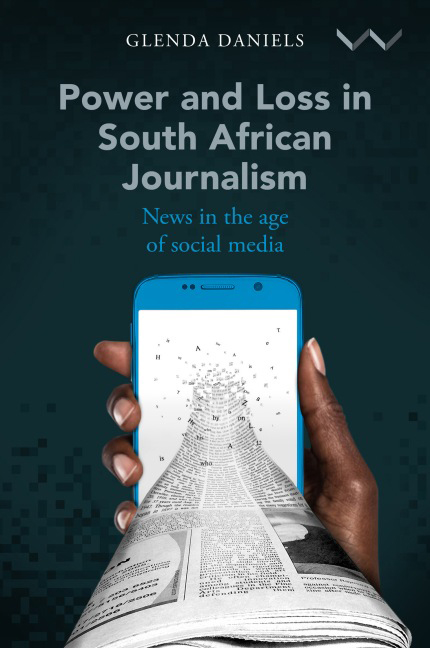Book contents
- Frontmatter
- Dedication
- Contents
- Tables and Figures
- Preface
- Acknowledgements
- Acronyms and Abbreviations
- 1 Power and Subjection in the Media Landscape
- 2 The Media, the State and Zuma’s ANC
- 3 ‘Zupta’: Power and Loss in Investigative Journalism
- 4 The Job Loss Tsunami
- 5 Going Online When You’re Offline: The Case of Community Media
- 6 The Anti-Feminist Backlash, the Glass Ceiling and Online Trolls
- 7 Decolonial ‘Green Shoots’
- 8 Power, Loss and Reimagining Journalism
- Epilogue
- Appendices
- Appendix A Press Code of Ethics and Conduct for South African Print and Online Media (effective from 1 January 2016)
- Appendix B amaBhungane Stories in the Past Two or Three Years
- Notes
- Glossary
- Bibliography
- Index
8 - Power, Loss and Reimagining Journalism
Published online by Cambridge University Press: 10 September 2020
- Frontmatter
- Dedication
- Contents
- Tables and Figures
- Preface
- Acknowledgements
- Acronyms and Abbreviations
- 1 Power and Subjection in the Media Landscape
- 2 The Media, the State and Zuma’s ANC
- 3 ‘Zupta’: Power and Loss in Investigative Journalism
- 4 The Job Loss Tsunami
- 5 Going Online When You’re Offline: The Case of Community Media
- 6 The Anti-Feminist Backlash, the Glass Ceiling and Online Trolls
- 7 Decolonial ‘Green Shoots’
- 8 Power, Loss and Reimagining Journalism
- Epilogue
- Appendices
- Appendix A Press Code of Ethics and Conduct for South African Print and Online Media (effective from 1 January 2016)
- Appendix B amaBhungane Stories in the Past Two or Three Years
- Notes
- Glossary
- Bibliography
- Index
Summary
True power does not need arrogance, a long beard and a barking voice. True power strangles you with silk ribbons, charm and intelligence.
Oriana Fallaci, cited in Slavoj Žižek, First as Tragedy, Then as FarceThe conundrums of power and loss this book has discussed include the increasingly populist nature of politics and the concomitant information disorder causing trust in journalism to erode. Social media usage proliferates. Women journalists are targeted in brutal cyber attacks. Job losses in newsrooms are severe. Important beats, such as courts, labour and books, have all but disappeared from mainstream media, and community media has largely moved to Facebook – while the big tech companies are now under scrutiny over their unregulated power. In essence, a crisis in journalism exists, which should also then present the craft with opportunities for change.
The power gains include that investigative journalism has increased, and collaborations – intracountry, continentally and internationally – rather than competition characterise the new genre of working. There are new start-up media companies that are doing journalism differently, from the ground up, and there are also, in mainstream media, green shoots in thinking, as in the framing and the coverage of the Afro hair saga. The gaze in this instance emanated purely from the perspective of the black woman's experience, or a decolonial lens. There is some evidence of reflection in action.
Could it be the time for professional journalists and owners of the news media to press the pause button, to slow down, to take three steps backwards in order to take two steps forward? Is it time to stop chasing social media, likes, clickbaits, algorithms, innovation and, indeed, all ‘bright, shiny new things’ (to use Julie Posetti's phrase)? Some media analysts argue that the only way forward is to demand Facebook pay for journalism. But that would increase Facebook's grip on journalism, its owning the public space even more.
Much of the content of this book has illustrated the losses for journalism over the period that the internet has marginalised the traditional news media, and the social and political price paid. Nevertheless, there is much good that remains, located in investigative journalism, collaboration (as opposed to competition) including cross-border or international public donor funding, new ways of reporting in some start-ups, and a greater assertiveness by women in the media.
- Type
- Chapter
- Information
- Power and Loss in South African JournalismNews in the Age of Social Media, pp. 153 - 166Publisher: Wits University PressPrint publication year: 2020

